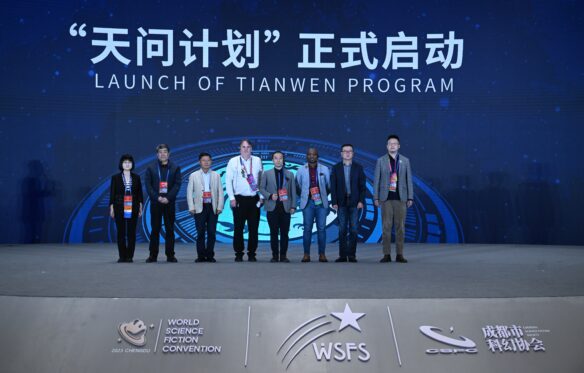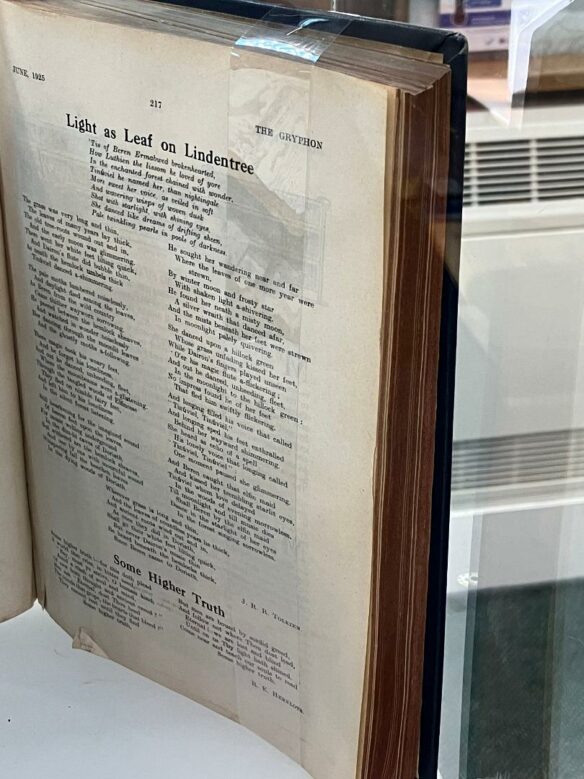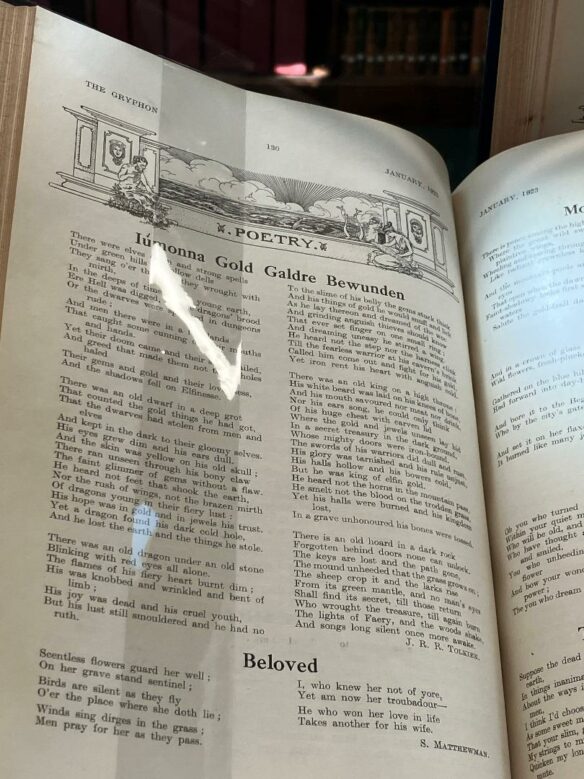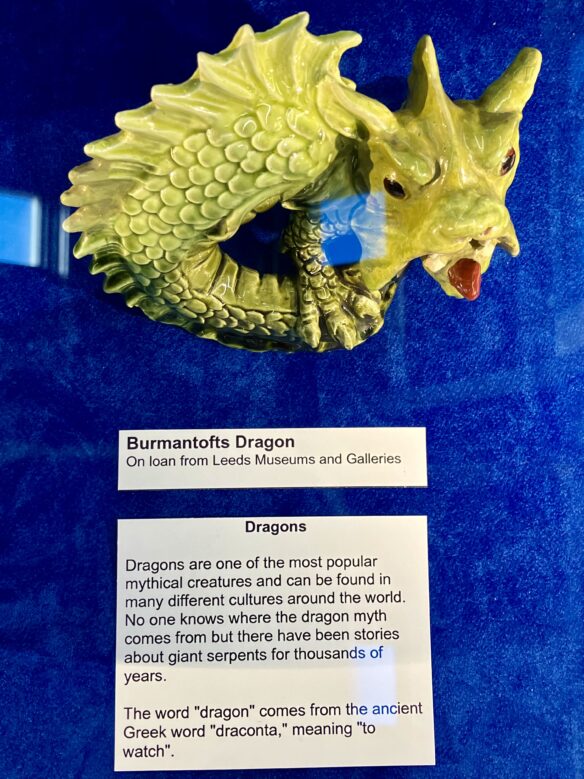
[AUTHOR’S NOTE: This is posted anonymously to protect the author’s identity, as the author is part of the Chinese diaspora who occasionally travels to China.]
On the heels of the Chengdu 2023 Worldcon Hugo Controversy (“Science fiction awards held in China under fire for excluding authors”; The Guardian), some sharp eyes noticed an announcement that happened immediately after the Chengdu 2023 Worldcon, to the effect that China was kicking off its Tianwen project, “Unveiling China’s Diverse Science Fiction to the World” (NewsDirectory3). There is a lot to unpack in this announcement. I am writing this to hopefully provide some guidance on how to “read these tea leaves”, as understanding the Tianwen project might also shed some additional light on the Hugo Awards issue and the Chengdu Worldcon in general.
First off, what is “Tianwen”? The phrase means “Questions for Heaven”, and is also the title of a set of poems consisting of 182 questions about the nature of mythology that was written during the Warring States period more than 2000 years ago.
The news article reads:
More than 2,000 years ago, the great Chinese poet Qu Yuan asked the sky: There are nine heavens, [but] who arranged the nine heavens? That is the sigh [sic] of a thousand years of the Chinese people following the mysteries of the universe. Today, such questions still exist, and people use Science Fiction to describe imaginary answers.
Particularly in the last couple of decades, China has been promoting and encouraging nationalistic attitudes in its citizens. The narrative that “China is strong” is emphasized as a counter to the “hundred years of shame”, a phrase used by the Communist Party of China (CPC) to describe the hundred or so years starting in the 1840s with the Opium Wars until “glory was restored to the Middle Kingdom by the CPC” in the 1940s (conveniently ignoring the Cultural Revolution, the Great Famine, etc.). The goal has been to simultaneously de-legitimize the previous two ruling regimes, the Qing dynasty and the Republican government, while promoting the narrative that the CPC not only lifted China out of poverty and has grown the nation into the second largest economy in the world, but that China is also powerful on the world stage. To the Party, the CPC and China are synonymous, and the survival of the CPC is the survival of the nation. To roughly adapt a couple of phrases from a different imperialist context: “L’État, c’est nous“ and “Sans nous, le déluge” – The Nation is us” and “Without us, disaster”.
In the book The Party: The Secret World of China’s Communist Rulers, Richard McGregor wrote: “The Party treats History as an issue of political management in which the preservation of the Party’s prestige and power is paramount”. The CPC’s pervasive narrative is that China’s long and glorious history is unmatched by all other countries. While China was actually ruled by successive dynasties and at times fragmented into smaller kingdoms and even occasionally under foreign control, a direct link to ancient times symbolically solidifies the implication that the CPC has acquired the historical “Mandate of Heaven”, the divine right to rule the Middle Kingdom. “Tianwen” is thus an overt connection with a glorious historical past.
For some context regarding the CPC and the ancient idea of ruling by Mandate of Heaven, see this article from the official China CPC news op-ed: 中国共产党的文化天命–理论-人民网 (People.com). You can use Google Translate to read it. In particular, the opening paragraph:
The so-called “mandate of destiny” refers to the irresistible historical inevitability. The great rejuvenation of the Chinese nation depends to a certain extent on the rejuvenation of Chinese culture, and the great mission of reviving Chinese culture is undoubtedly undertaken by the Communist Party of China.
With that in mind, let’s continue with the article about the Tianwen announcement:
The significance of their joint release from the “Consensus” lies in the coherence of the “Consensus”. Various industries will gather consensus to build the cornerstone of the science fiction industry, and fans and users from all over the world will gather consensus that “the science fiction industry is vast and limitless.” Eventually, the science fiction industry will release momentum. and really explodes with mighty power.
I don’t know whether it’s just the nature of translating Chinese press pieces, but this article repeats certain themes a lot, and the above is a summary and a repeat of previous themes.
Two main points here are that China wants to use the Tianwen project to unify the Science Fiction industry, placing everything from publishing, awards, movies, games, and other IP under one umbrella — which I’m sure, will also eventually incorporate even the actual space exploration industry in some way. Second, not only is the focus on China itself, but the goal is stated for the Science Fiction industry to “explode[s] with mighty power [onto the world]”.
The tone of this sounds familiar. One only has to look at the “One Belt, One Road” initiative, a Chinese global infrastructure development strategy, to see the parallels. With “One Belt, One Road”, China basically loans money and resources to developing countries to develop their infrastructure, which in theory would increase the global GDP. Unfortunately, there are downsides to this strategy, as it has caused environmental damage to local systems, and often also puts these nations heavily in debt to China, sometimes necessitating neocolonial-style concessions to China. The economic impact and geo-political implications of this policy are currently the subject of many academic and political debates. Nevertheless, with over 130 countries participating, China is able to exert its power far beyond its borders.
Within its borders, one has to understand that the CPC’s primary motivation is to maintain its iron grip rule on the country. There is often little official regulation, but many unspoken rules; “you can say whatever you want”, and even a company or corporation “can do anything it wants”, right up until it conflicts with the CPC’s interests. China’s famous Great Firewall and its censors do not sleep.
A citizen’s “social credit number” impacts everything, from being able to put your children in good schools to being allowed to buy a high speed train ticket. Additionally, a powerful weapon in squashing any type of dissent is the liberal use by local authorities of the deliberately ambiguously-worded law against “picking quarrels and provoking trouble”. This law has been broadly applied to things like fights in public, insults to people, sex between people of the same gender, and even as a censorship tool, for example against activists who archived censored internet materials regarding COVID-19 during the early days of the pandemic.
On the flip side, China’s government knows it has to keep the populace content, and providing entertainment is a part of the time-honored strategy of “Bread and Circuses”, as the policy was called in ancient Rome. Once the rise in popularity of anything (e.g.: Science Fiction) has attracted the notice of the Chinese State, the State considers only two options: should it be suppressed, or should it be exploited? In that role, the push for greater consumption of Science Fiction from books, movies, and video games makes a lot of sense. Production of those media, especially in movies, TV, games and AI, will drive technological development, which also serves China’s goal to achieve dominance in the global technology economy.
Of course Science Fiction promotes speculative thinking and imagination, as even the China news piece acknowledges. Does that mean that China would be open to its citizens thinking about different scenarios of government and society? Not at all; it’s well known that China exercises strict censorship on published works and online activity – “Redacted Fantasy: China’s Dystopian Censorship of Online Fiction – Lacuna Magazine” at Justice. In addition, alternate histories, especially about modern times, and time travel stories which touch on certain subjects, are strictly forbidden. There is no explicit list of forbidden subjects, but it is clear that the censors’ mandate is to ensure that the CPC exists and continues to exist as the protector and inheritor of 5000 years of Chinese culture. Any fictional piece involving time travel that might postulate even an event that would have prevented the CPC from inheriting the Middle Kingdom is thus obviously not allowed.
Having industrial companies consolidate and work directly with government agencies allows the government greater control of this burgeoning industry. It’s far easier to have corporations toe the Party line, and have companies control and influence their own assets, rather than the government having to address them individually. A greater uniform image presented to the outside world also makes censorship and subtle messaging easier. So, this push for industry control makes perfect sense to the CPC. In fact, the fewer individual companies and the larger the companies, the better it is for the CPC, as directives can be more easily passed down through the hierarchical chain of command.
If one manages to catch videos of the Chengdu 2023 Worldcon Opening, Closing, and Hugo ceremonies, and other photos and videos taken during the convention, they clearly have a high professional corporate production value, and we can expect similar glitz and blitz from the Tianwen project. At a meta level, industry-controlled conventions and awards are counter to the fandom ideal of “For Fans and By Fans”. Only time will tell how well the non-China world and its fans may accept this initiative.
Finally, regarding the Hugo controversy itself: one fact to keep in mind is that the CPC takes “saving face” (the cultural art of preserving one’s image and avoiding situations that may cause embarrassment or loss of respect) to another level. The fallout within China is yet to be seen. There may be genuine Chinese fans who might be unjustly punished, and even more scrutiny on the Chinese diaspora.
In a 2019 New York Times interview, Ken Liu, a multi-Hugo winning author for both his own work and his translation of Cixin Liu’s seminal book The Three-Body Problem, said this:
“The political climate inside China has shifted drastically from when I first started doing this,” Liu says. “It’s gotten much harder for me to talk about the work of Chinese authors without putting them in an awkward position or causing them trouble.” Liu usually travels to China at least once a year to network and meet new writers, and has attended the Chinese Nebula and Galaxy Awards, the country’s most well-known science-fiction prizes. But this year he was denied a long-term visa, without explanation, prompting him to cancel his planned trip.
In the site selection vote at the DC Worldcon in 2021 where Chengdu won its bid to host the 2023 Worldcon, a number of people campaigned against the bid, citing China’s problematic record of human rights violations and censorship. These voices were countered by others promoting an idealized vision of hosting the Worldcon in an Asian country for only the second time in history and opening the door to a greater exchange of Science Fiction between Chinese fans and the rest of the fandom, and even by accusations that those opposing the bid were largely motivated by racism.
While it is true that the representation of minorities within US and European fandom is still insufficient, the Chengdu Worldcon appears to have been a failed experiment. It might have begun as a dream of sharing and spreading international fandom, but moving forward, at least within China, Science Fiction will no longer be just a genre driven by fandom, but a medium to be heavily exploited by, and at the whim of, the State.













